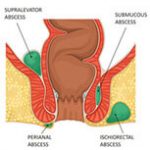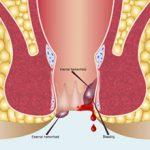Get Permanent Relief from Painful Symptoms of Anal Fistula
Get seamless experience of treating fistula symptoms permanently with the most advanced laser surgery
Book Free Appointments With Our Expert Doctors
- Get free consultation for 50+ diseases
- In-person and online consultation with experienced doctors
- Extensive medical assistance throughout your treatment

According to the NABH Norms
No Cuts, No Wounds, Painless*
Insurance Paperwork Support
Web-View
Technology
What is an anal fistula?
An anal fistula is a small tunnel that connects an infected gland in and around the anus to the skin around the anus. An anal fistula can cause swelling and pain around the anal area. Anal fistulas are infected cavities that become filled with debris and pus. Globally, 90% of anal fistulas result due to acute anal infections.
Book Your Appointment
Overview of Anal Fistula
→ Infection
→ Perforation
→ Sepsis or organ death
→ Incontinence
→ Fistula Recurrence
→ No cuts, no stitches, no scars
→ 30-min procedure
→ 1-day discharge
→ Most Effective Treatment
→ Relief from pain while sitting
→ Relief from bleeding in stool
→ Reduces chances of anal cancer
→ Cures Inflammation in the anal region
→ Treats Rectal Prolapse
→ 30% off on diagnostic tests
→ Confidential consultation
→ Single deluxe room
→ Free follow-ups post-surgery
→ 100% insurance claim
→ All Insurances covered
→ No upfront payment
→ No running behind insurance authorities
→ Paperwork by Surgicare team on your behalf
Causes of Anal Fistula

Long-standing abscess

Underlying Medical conditions

Sexually Transmitted Diseases

Tuberculosis

Trauma
Symptoms of Anal Fistula

Bleeding

Skin Maceration

Perianal swelling

Pus or blood discharge

Pain during bowel movements/urination
Treatment of Anal Fistula

Read More
- Cost-effective
- No cuts or incision
- No risk of infection during and after the surgery
- Less chance for recurrence of anal fistula
- Patients can resume normal activities within 24 hours
- Quick recovery from the treatment
Why Surgicare ?
Surgicare is COVID-19 safe
our safety is taken care of by thermal screening, social distancing, sanitized clinics and hospital rooms, sterilized surgical equipment and mandatory PPE kits during surgery.
Post Surgery Care
We offer free follow-up consultations and instructions including dietary tips as well as exercises to every patient to ensure they have a smooth recovery to their daily routines.
Medical Expertise With Technology
Our surgeons spend a lot of time with you to diagnose your condition. You are assisted in all pre-surgery medical diagnostics. Our procedures are according to the norms of NABH.
Assisted Surgery Experience
A dedicated Medical Coordinator assists you throughout the surgery journey from insurance paperwork, to free commute from home to hospital & back and admission-discharge process at the hospital.
Frequently Asked Questions
How can I know that I have a fistula?
If you notice any of the following in or around your anus, you may have an anal fistula.
- itching
- pain & swelling
- irritation
- bright red color bleeding
- foul-smelling drainage [pus]
- irritation of the skin
What is the difference between anal fistula and piles?
A small tunnel that cracks open into the other organ forming an abnormal connection between two organs, is a fistula. On the other hand, piles is a condition where a cluster of blood vessels, tissues, muscles and elastic fibres can be noticed in the anal area.
What is the difference between fistula disease and fissure?
Fistula is an abnormal tract or tube-like connection that is formed between two different organs or tissues [anal fistula: the connection between anal canal and skin near the anus]. An anal fissure is a small crack, tear or cut in the lining of the anus.
What will happen if a fistula is left untreated?
If you avoid or delay anal fistula treatment, it can lead to serious complications like sepsis [bacterial infection] and can lead to low blood pressure, organ damage, and even death. To avoid such things, we recommend you not to delay or avoid the anal fistula treatment. At Surgicare, you can undergo the latest and advanced laser anal fistula surgery at an affordable cost.
What are the qualifications of anal fistula doctors?
Proctologists, General surgeons, or colorectal surgeons can perform anal fistula surgery and below are their qualifications.
- MS - General surgery
- DNB - General surgery, surgical gastroenterology
- FRCS - General Surgery [colorectal]
- DNB - Surgical gastroenterology
- FRCS - General surgery [colorectal]
- MD - Colorectal surgery
- Diplomate in the colon and rectal surgery
At Pristyn Care, you can get the best and safest anal fistula surgery from well-experienced proctologists with minimal or no risks and complications.
How long does it take to complete anal fistula surgery?
Usually, anal fistula doctors may take around 1-3 hours to complete the anal fistula surgery. However, this changes due to factors like:
- Age of the patient
- Type of anal fistula surgery/treatment planned to perform
- Size and severity of anal fistula
- Presence of any underlying anorectal disease or disorder
How long it takes to recover from fistula surgery?
Individuals who undergo fistula surgery may take about a week to get back to their daily routines. However, to recover completely from a fistula surgery, one can take 4-6 weeks. Though, this time period is subject to change depending on factors like:
Age of the patient
Post-surgical care followed by the patient
Type of fistula surgery underwent
Severity and size of anal fistula tracts
What is the success rate of fistula surgery?
The success rate of fistula surgery is not constant or the same for each patient. It varies from one patient to another due to:
The age fo the patient
Type and severity of anal fistula that is treated or removed
Type of fistula surgery performed [laser or open]Underlying anorectal diseases that can hinder the outcomes of the surgery
Depending on these, the success rate of fistula surgery can range between 75% to 97%.
What are tests used to diagnose anal fistula?
Below are a few of the tests that can be used to diagnose anal fistula:
- Digital rectal examination
- Colonoscopy
- Anoscopy
- CT-scan
- MRI scan
- Ultrasound
Quick Facts on Fistula
- If not treated properly, an anal fistula may potentially cause bowel incontinence
- In complicated vaginal deliveries, an obstetric fistula may develop between the rectum and the vaginal cavity
- People younger than 40 years of age have higher risks of developing anal fistula
Read More
Home remedies for anal fistula
Following are some of the ways to manage fistula at home:
- Eat a high-fibre diet and drink plenty of water.
- Soak the anal area for 15-20 minutes 3-4 times a day.
- Wear a pad over the anal area to prevent the spillage of pus drainage.
- Use a stool softener.
- Resume physical activities only when the doctor recommends.
How to prepare for anal fistula surgery?
The surgeon usually guides the patient on how to prepare for anal fistula surgery. If the patient smokes or consumes alcohol regularly, the surgeon may ask him or her to stop those immediately.
The anal fistula surgery might be done under the influence of local or general anesthesia. The effects of the anesthesia need a few hours to wear off, and as such, it is recommended for the patient to bring someone who can accompany the patient during the hospital stay or while driving back home.
On the day of the surgery, the vitals of the patient will be checked to confirm if the surgery can be proceeded with or not.
What happens during and after laser fistula surgery?
In laser fistula surgery, the surgeon introduces laser heat into the fistula which passes through the opening of the rectum. Once the laser is activated, it causes the fistula tissues to shrink down. The surgeon slowly draws back the laser through the fistula, sealing the channel behind it. The surgeon then closes the internal opening either with a suture or a skin flap.
After laser surgery for anal fistula, the patient is kept under observation for a few hours. During this healing process, the doctor monitors the vitals of the patient’s body. The patient is discharged in less than 48 hours.
The patient can anticipate feeling some discomfort for a week after the surgery. Over-the-counter pain killers can be taken for relief. Additionally, warm baths can also be taken to dry the affected area carefully afterwards. The recovery process after laser fistula surgery is generally hassle-free and causes no complications. However, it is highly advised for the patient to follow the suggestions of the doctor until complete recovery.
Which treatment is the best for anal fistula?
Anal fistula is one of the common colorectal diseases in which an abnormal tract grows to connect the anorectal mucosal tissue with the exterior anal skin. There are different types of treatment methods for anal fistula, viz, fistulectomy, laser anal fistula surgery, and Before concluding which surgery is the best one for you, let’s help you understand these treatment options for anal fistula.
1. Fistulectomy
In this surgical process for anal fistula, the surgeon drains and eliminates the fistula tract under the influence of anesthesia. Once the tract is completely drained, the surgeon seals the opening and allows the tract to heal. This process is recommended only in the case of complex anal fistulas. Fistulectomy has the risk of damaging the sphincter muscles and causing faecal incontinence in the patient.
2. Laser fistula surgery
Laser fistula surgery is considered to be the most advanced and safest treatment for anal fistula. The process is carried out under the influence of anesthesia and is completed within 30-40 minutes. In this process, a laser probe is inserted into the fistula tract which damages the tract and allows it to shrink. The treatment is considered much more effective than conventional methods of surgery since there are no incisions and wounds involved in the process.
3. Ksharsutra
This is the ancient ayurvedic technique of treating anal fistula. In this process, a thread that is alkaline in nature is tied inside the fistula. The thread irritates the tract and causes it to inflame. This is a non-invasive treatment that also helps in getting rid of the dirt, pus and debris from the fistula tract. However, in most cases, the treatment does not show effective results in the first session and hence the patient needs to undergo multiple sessions to treat the fistula. There is also a scope of recurrence in this process of anal fistula treatment.
Medical practitioners consider laser surgery as the best treatment for anal fistula. The positive sides that make this process the best treatment among all are:
- Short surgical process
- Can be performed as a daycare process
- The surgical site heals faster than conventional surgeries
- Painless process
- No recurrence
Know More About Surgicare ?
All humans deserve equal treatment but everyone cannot afford costly treatments at multispeciality or super-specialty hospitals.
In India, many people don’t even have mediclaim to deal with medical emergencies. Also, there is a lack of experienced professionals to consult for a second opinion in case of surgery. Surgicare & ICU is built keeping in view the above points. It offers surgery and post-surgery critical care.
Surgicare & ICU Hospital is well equipped for all kinds of surgeries and offers one of the best ICU teams of Vadodara to take care of critical patients. It offers help to all those patients who do not have mediclaim but need treatments. Surgicare & ICU offers the opportunity for second opinions.
